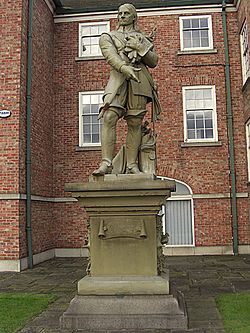Statue of Oliver Cromwell, Warrington facts for kids
Quick facts for kids Oliver Cromwell |
|
|---|---|
 |
|
| Year | 1899 |
| Type | Statue |
| Medium |
|
| Subject | Oliver Cromwell |
| Dimensions | 304 cm (120 in) |
| Location | Warrington |
| 53°23′10″N 2°35′32″W / 53.38613°N 2.59216°W | |
A statue of Oliver Cromwell stands on Bridge Street in Warrington, a town in Cheshire, England. This sculpture shows Oliver Cromwell, who was a very important leader in English history. He was known as the Lord Protector of the Commonwealth of England, Scotland and Ireland. This means he was the head of the country for a time, like a president, but not a king.
The statue was designed by a sculptor named John Bell. It was put up in 1899. This statue is one of only four public statues of Cromwell in the whole United Kingdom. It has been officially recognized as a "Grade II listed" building since 1973. This means it's an important historical structure that needs to be protected.
Contents
About the Statue
What Does It Look Like?
The statue was made by John Bell, a sculptor from London. It is made of iron and shows Cromwell standing up. He is holding a sword and a bible. He is also shown without his hat. The statue stands on a square base, called a plinth. You can see the name "Cromwell" written on it as a signature.
Why Was It Built?
The statue was first shown at a big event called the 1862 International Exhibition in London. It was part of a fountain there. Later, in 1899, a local councilor named Frederick Monk gave the statue to the town of Warrington. He did this to celebrate 300 years since Cromwell was born.
A Gift to the Town
In January 1899, Frederick Monk wrote a letter to the town council. He explained that Cromwell's 300th birthday was coming up on April 26th. He thought it was a good chance to give the town a statue of this "remarkable man." He suggested putting it in front of the Town Hall or in the gardens.
Monk knew that people had different ideas about Cromwell. But he believed everyone would agree that Cromwell was wise and brave. He said Cromwell guided the country during a difficult time. He also mentioned that Cromwell made sacrifices to protect the religious and political freedoms of the people.
Debates and Discussions
The idea of accepting and putting up the statue caused a lot of discussion. The Warrington Town Council debated it very strongly. There were some people in the local Irish community who did not agree with having the statue. However, the council eventually decided to accept it.

